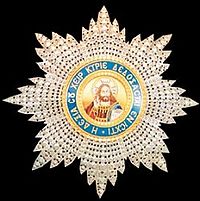Order of the Saviour
| Order of the Redeemer Τάγμα του Σωτήρος |
|
|---|---|

Star of the Order of the Redeemer
|
|
| Awarded by the President of the Hellenic Republic | |
| Type | Order |
| Motto | Η ΔΕΞΙΑ ΣΟΥ ΧΕΙΡ, ΚΥΡΙΕ, ΔΕΔΟΞΑΣΤΑΙ ΕΝ ΙΣΧΥΙ |
| Awarded for | exceptional services to Greece |
| Status | Currently constituted |
| Grades | Grand Cross, Grand Commander, Commander, Gold Cross, Silver Cross |
| Precedence | |
| Next (higher) | None |
| Next (lower) |
Order of George I (1915-1924) Order of the Phoenix (1926-1935) Order of Saints George and Constantine (1936-1975) Order of Honour (since 1975) |
|
Ribbon bar |
|
The Order of the Redeemer (Greek: Τάγμα του Σωτήρος), also known as the Order of the Saviour, is an order of merit of Greece. The Order of the Redeemer is the oldest and highest decoration awarded by the modern Greek state.
The establishment of the Order of the Redeemer was decided by the Fourth National Assembly at Argos in 1829, during the final year of the Greek War of Independence. The decision was not immediately implemented, however, and the relevant decree was signed in Nafplio by the Regency Council (Josef Ludwig von Armansperg, Karl von Abel and Georg Ludwig von Maurer) in the name of King Otto on May 20, 1833. According to the decree of establishment, the name of the Order "shall recall the, by divine assistance miraculously and fortuitously accomplished, salvation of Greece".
Since its establishment in 1833, and in common with all Greek orders of merit, the Order of the Redeemer has five classes:
According to the original decree, the Order was to be awarded to those Greek citizens who partook in the War of Independence, or "who should distinguish themselves henceforth in any branch of public service, in the army and navy, in the diplomatic and judicial corps, in public administration, in the arts, science, agriculture and industry, commerce, or should distinguish themselves in any other social field through outstanding civic virtue, and through illustrious services to the Throne, for the Glory of the Hellenic name and for the welfare of the fatherland", while foreigners were admitted either for past services to Greece, or due to their ability "to bring honour to the Order, through their outstanding personal virtues and excellence".
The original decree set specific limits on the number of awards: while the Silver Cross could be awarded at will, Gold Crosses were limited to 120, Commanders to 30, Grand Commanders to 20, and Grand Crosses to 12. Foreign recipients, as well as princes of the Greek royal family, did not count to these totals. In modern times, in practice the Grand Cross is awarded only to foreign heads of state.
...
Wikipedia
